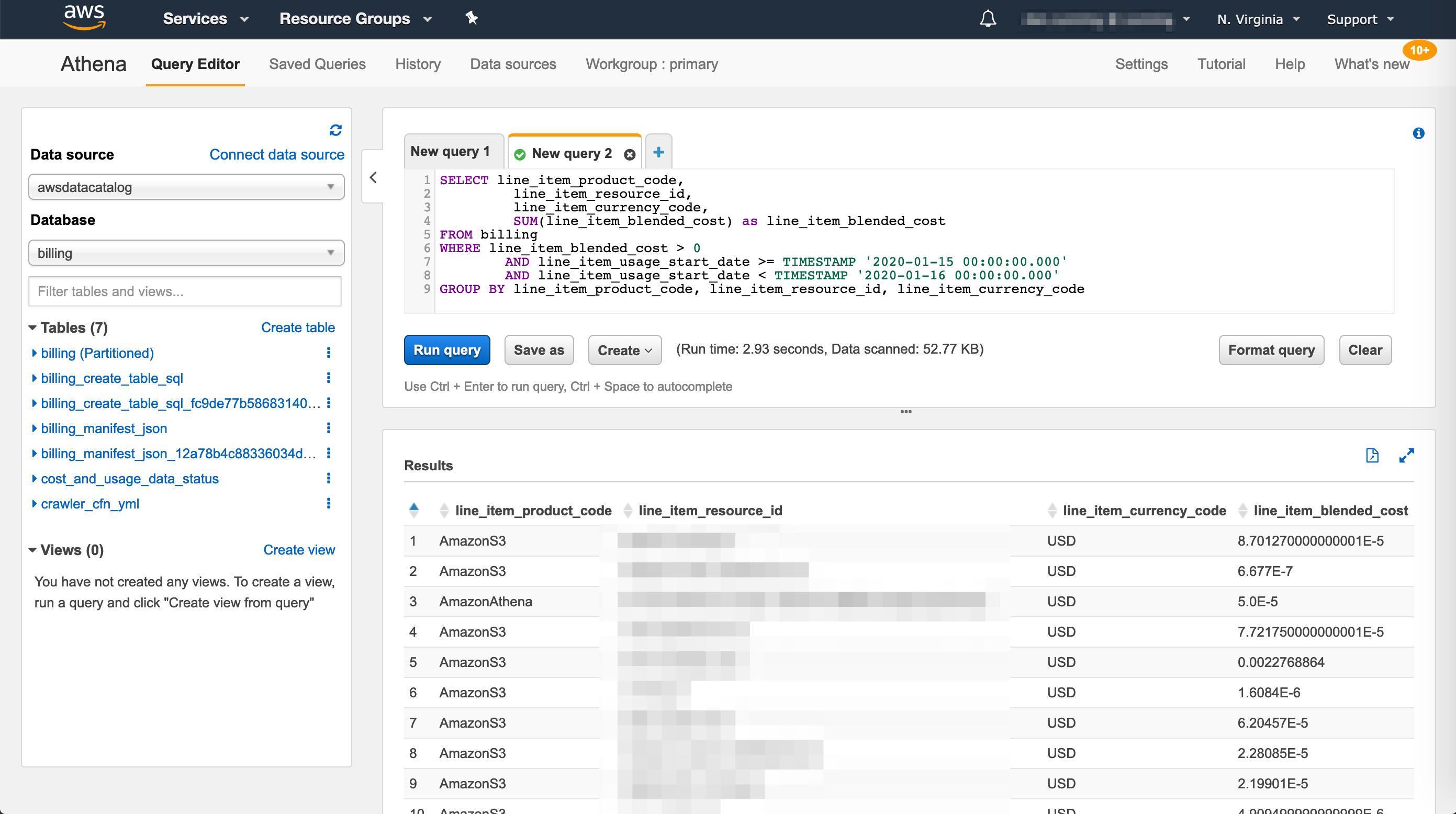Published by Dan Cunning on Jan 17, 2020
Tracking your AWS costs
Filed under Features, Web Services
The Problem
Amazon Web Services (AWS) offers an enormous amount of products, with reasonable pricing for a hobbiest (pay for what you use) or business (save on sysadmin wages). However, their monthly bill doesn't have any details: just the service, the charges, the taxes, and the total.
I wanted more granular look in my morning update email, and here's how I got it done.
Capturing the data
Amazon's Creating an AWS Cost and Usage Report guide offers a step-by-step breakdown to follow. I used "include resource IDs" so I can see costs of specific EC2 servers. I also selected "Enable report data integration for Amazon Athena" since it's a database that only charges when you query it.
You have to wait a day or so for Amazon to writing some billing data to your S3 bucket, then proceed to the next step.
Reading the schema
Now we turn to the aptly named AWS Glue to crawl our S3 bucket's new billing data and write its database schema to AWS Athena.
I configured the crawler to "Run Monthly" on the 1st, and allowed Glue to create a new IAM role with permissions to do the work it needs to do. All-in-all the crawler cost me $0.02 to run once. Refer to the previously noted Amazon guide‘s "Configuring Athena data integration" section for more details here.
Querying the costs
After the Glue crawler finishes, we're ready to start querying. Visit AWS Athena and you'll see a new database and its tables.

Play around with different queries inside Athena's UI. Here's what I use to query daily costs by resource:
SELECT line_item_product_code,
line_item_resource_id,
line_item_currency_code,
SUM(line_item_blended_cost) as line_item_blended_cost
FROM billing
WHERE line_item_blended_cost > 0
AND line_item_usage_start_date >= TIMESTAMP '2020-01-15 00:00:00.000'
AND line_item_usage_start_date < TIMESTAMP '2020-01-16 00:00:00.000'
GROUP BY line_item_product_code, line_item_resource_id, line_item_currency_code
Adding costs to the email
Every morning my system prepares a report with important information from the previous day: active users, support statistics, and application health. I'm excited to add "application cost" to that list! Here's the relevant code:
class GatherAwsCosts < ApplicationService
attr_reader :start_response
attr_reader :wait_response
attr_reader :finish_response
attr_reader :csv
attr_reader :costs
def initialize(date, bucket_name, wait_delay: 1.second)
super
@date = date
@bucket_name = bucket_name
@wait_delay = wait_delay
end
def call
start_query_execution
wait_for_query_to_finish
download_results
process_results
end
private
def start_query_execution
@start_response = athena.start_query_execution(
query_string: sql_statement,
query_execution_context: {
database: "billing",
},
result_configuration: {
output_location: "s3://#{@bucket_name}/billing/results/",
},
work_group: "primary",
)
end
def wait_for_query_to_finish
loop do
sleep @wait_delay
Rails.logger.info "waiting for Athena query to finish"
@wait_response = athena.get_query_execution(
query_execution_id: @start_response.query_execution_id,
)
status = @wait_response.query_execution.status
case status.state
when "SUCCEEDED"
@finish_response = @wait_response
break
when "QUEUED", "RUNNING"
# continue waiting
else
raise "Unhandled query execution state: #{status.state.inspect} (#{status.state_change_reason})"
end
end
end
def download_results
bucket = s3.bucket(@bucket_name)
obj_url = @finish_response.query_execution.result_configuration.output_location
obj_key = obj_url.split("/")[3..].join("/") # remove s3://bucket_name
s3_object = bucket.object(obj_key)
@csv = s3_object.get.body.read
end
def process_results
@costs = []
CSV.parse(@csv, headers: true) do |row|
cost = row["line_item_blended_cost"].to_f
next if cost < 0.01 # ignore costs that are less than a penny
@costs << OpenStruct.new(
product: row["line_item_product_code"],
resource: row["line_item_resource_id"],
cost: cost.round(2),
currency: row["line_item_currency_code"],
)
end
@costs
end
def aws_credentials
{
access_key_id: Rails.application.credentials.dig(:aws, :access_key_id),
secret_access_key: Rails.application.credentials.dig(:aws, :secret_access_key),
region: Rails.application.credentials.dig(:aws, :region),
}
end
def s3
@s3 ||= Aws::S3::Resource.new(aws_credentials)
end
def athena
@athena ||= Aws::Athena::Client.new(aws_credentials)
end
def sql_statement
from = @date.to_s
to = (@date + 1.day).to_s
%(
SELECT line_item_product_code,
line_item_resource_id,
line_item_currency_code,
SUM(line_item_blended_cost) as line_item_blended_cost
FROM billing
WHERE line_item_blended_cost > 0
AND line_item_usage_start_date >= TIMESTAMP '#{from} 00:00:00.000'
AND line_item_usage_start_date < TIMESTAMP '#{to} 00:00:00.000'
GROUP BY line_item_product_code, line_item_resource_id, line_item_currency_code;
)
end
end
# app/mailers/reports_mailer.rb
class ReportsMailer < ApplicationMailer
def morning_report
@date = Time.zone.yesterday
@aws_costs = GatherAwsCosts.call(@date, "your_bucket")
end
end
<!-- app/views/reports_mailer/morning_report.html.erb -->
<table>
<thead>
<tr>
<th>Product</th>
<th>Resource</th>
<th>Cost</th>
</tr>
</thead>
<tbody>
<% @aws_costs.each do |line_item| %>
<tr>
<td><%= line_item.product %></td>
<td><%= line_item.resource %></td>
<td><%= line_item.cost %> <%= line_item.currency %></td>
</tr>
<% end %>
</tbody>
<thead>
<tr>
<th>Total</th>
<th></th>
<th><%= @aws_costs.sum(:cost) %> <%= @aws_costs.map(&:currency).uniq.join(' ') %></th>
</tr>
</thead>
</table>
Wrap-Up
Now every morning I get a complete list of the previous day's AWS expenses. Eventually I may drop it back to every week or two, but I'm not tired of studying the fluctuations yet. Here's some ideas for future work:
- Replace my EC2 instace resource IDs with its name via #describe_instances
- Graph the per day costs in a monthly report
- Turn this idea into a reuseable library

I'm a Ruby on Rails contractor from Atlanta GA, focusing on simplicity and usability through solid design. Read more »